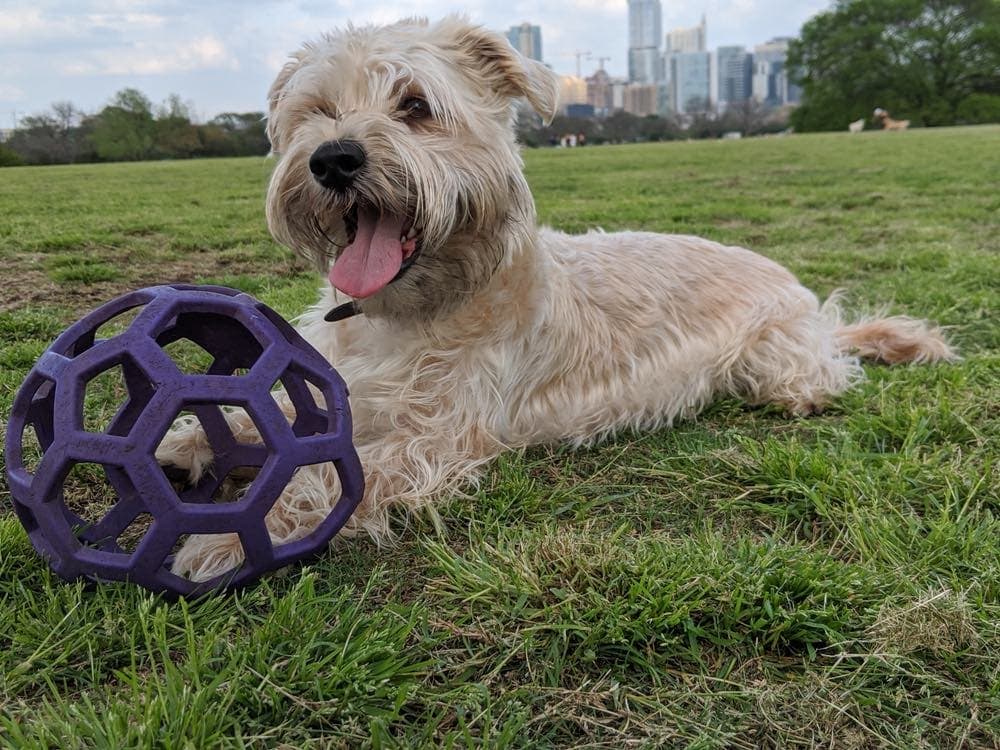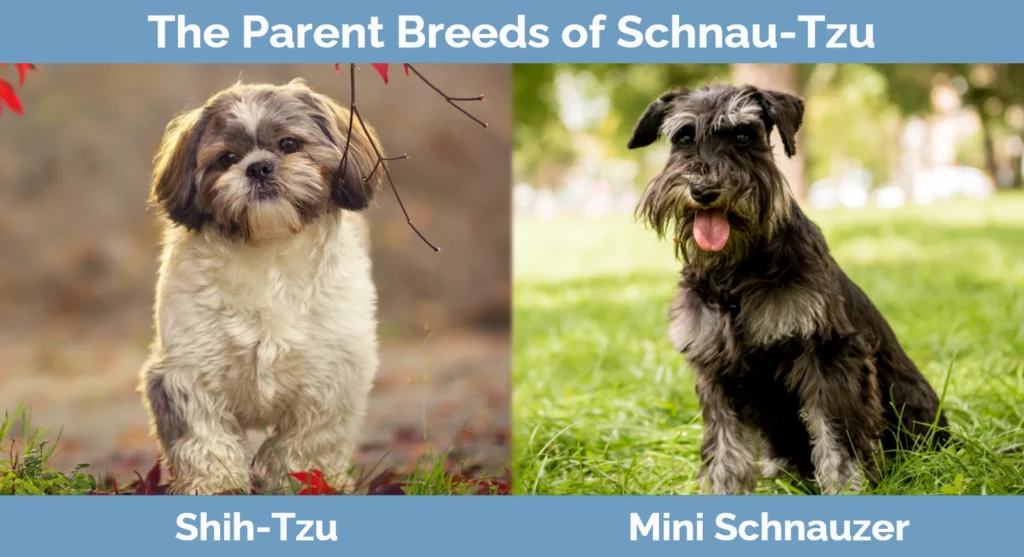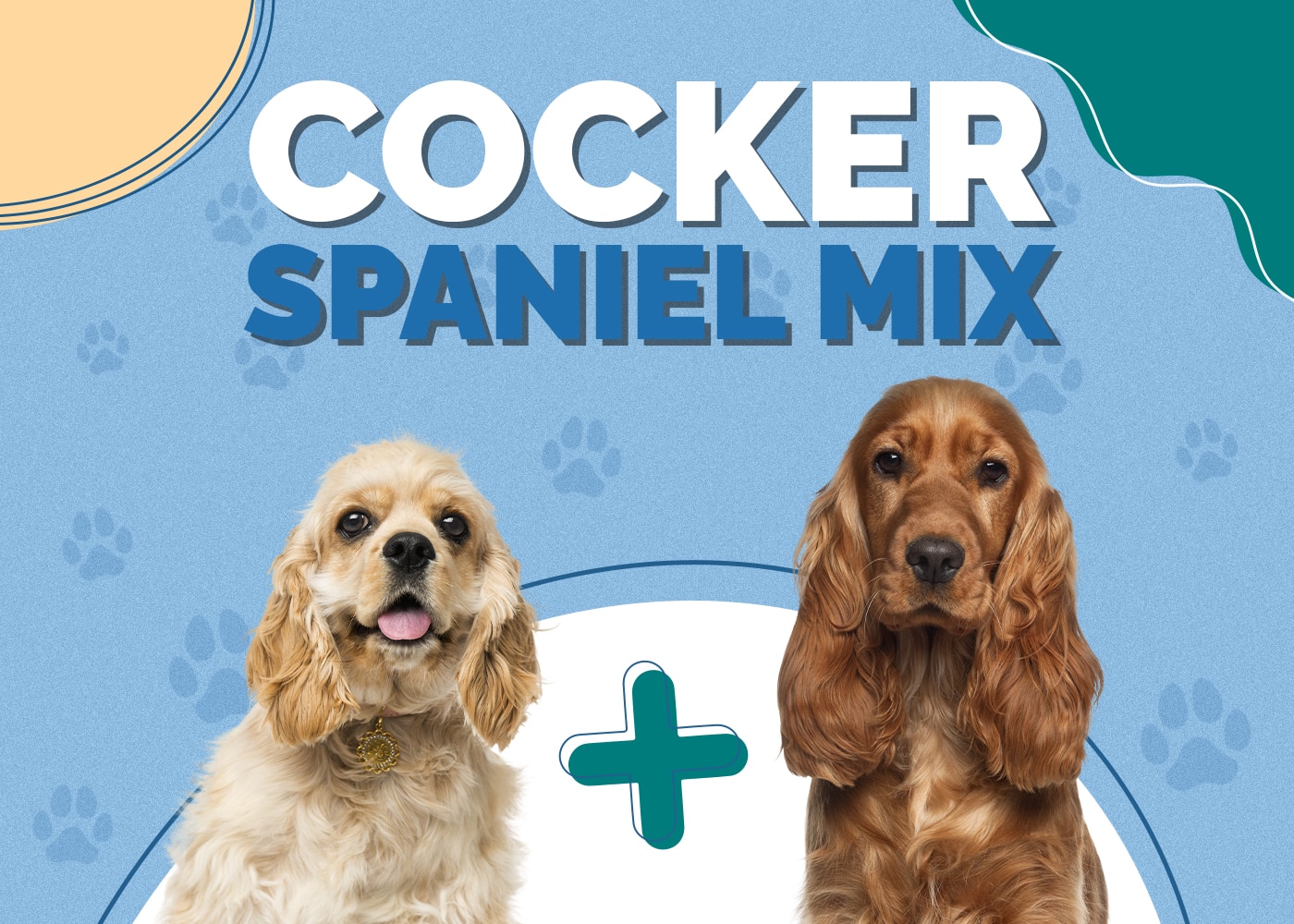Shih Tzu Schnauzer Mix (Schnau-Tzu) Dog Breed Info & Pictures

Updated on

| Height: | 5–7 inches |
| Weight: | 7–14 pounds |
| Lifespan: | 10–12 years |
| Colors: | Black, white, brown, fawn |
| Suitable for: | Active families with kids, apartment-living, owners who are frequently at home |
| Temperament: | Friendly, loyal, active |
The Schnau-Tzu is a happy and loyal companion that looks like a little teddy bear (if they haven’t been shaved). They have a spunky personality that comes from their interesting parental combination. The Schnau-Tzu is a hybrid dog that is a cross between a Miniature Schnauzer and a Shih Tzu.
The combination of these two lovable companion dogs makes this pup an excellent choice for a family pet. They thrive on their humans’ attention and don’t handle being alone for extended amounts of time very well. The Schnau-Tzu is adaptable to a large variety of living situations and companions.
Schnau-Tzu Puppies
These pups are quite affordable to purchase. They are also relatively cheap to feed because they do not have substantial bodies or appetites.
A Schnau-Tzu is a unique combination of relatively expensive breeds, the Miniature Schnauzer and the Shih Tzu. However, they don’t often reflect this in their prices because this affectionate hybrid’s popularity has yet to escalate and be more in demand.
It can sometimes be a challenge to find a breeder for this particular hybrid. The Miniature Schnauzer is not a particularly common breed in North America, which makes it even harder to find a breeder that hybridizes them with a Shih Tzu. Shih Tzus are much more common around the world and are easy to find.
When you find a breeder, ensure that they are set high standards for their practice and treat their puppies well. You can do this by asking for a tour through their facilities. They should be willing to show you every location that they allow their dogs.
Beyond this, it can be useful if you ask to see the registration papers of your potential puppy’s parents to prove the breed. You should also ask to see their veterinary records. If they have had any health issues that could be genetically inherited, it will be better if you know them and can alert your vet to keep an eye out.
3 Little-Known Facts About the Schnau-Tzu
1. The Shih Tzu was a popular dog for Chinese royalty.
The Schnau-Tzu is a relatively new cross of these two parents, and they do not have a detailed history. They are probably a result of the modern trend to create designer dogs. However, both of their parents have detailed and long histories.
The Shih Tzu’s history goes back thousands of years. Researchers believe that these adorable companion animals were crosses between Lhasa Apsos, which were more common in Tibet, and a Chinese dog, perhaps a Pekingese. Neither of these lineages has been proven, however.
We do know that these dogs first began to appear in the records of the Tang dynasty between the years 618 to 907 A.D. During this time, they were incredibly popular as pets of Chinese royalty and were treated with high regard.
As time went on, the Shih Tzu spread in popularity to more of China’s common folk, especially during the Ming dynasty. Even though they were widespread at this time, they were practically brought to extinction during the Chinese Revolution.
After the war, it was found that seven males and seven females had been saved to continue the lineage. All modern Shih Tzus are theorized to have come from these 14 pups. It wasn’t until the 1900s and World War II that these beloved dogs began to spread to other countries around Europe and North America. The American Kennel Club recognized them in 1969.
2. Schnauzers come from Germany and date back to the Middle Ages.
Schnauzers are thoroughly German dogs that date back to the Middle Ages before Germany was known by its current name. We know of them because of their distinct appearance and artist Albrecht Durer displaying them in his carved artwork. The first Schnauzers are thought to have come from a mixture of German Poodles, Wire-Haired Pinschers, and the Wolf Spitz.
At first, Schnauzers were bred to be farm dogs and useful hunting companions. At this point, they were primarily a large breed dog. Thus, they were used to protect farmers and others with their large stature and loyal personality.
Then, in the 19th century, the standard Schnauzers began to be bred smaller in some areas. The reason for this was to have a dog with a similar personality as the standard, but in a size that would give them the ability to get into small areas and hunt rats and rabbits. They were crossed with Miniature Pinschers, Affenpinschers, Poodles, and even Pomeranians.
Many dogs of German breeding suffered a great deal of hardship during the World Wars. These dogs had spread internationally and gained a loyal following before this time and remained more popular than many German pups.
3. The Schnau-Tzu is one of the most adaptable and affectionate Shih Tzu hybrids.
The combination of the Shih Tzu and the Miniature Schnauzer makes an intelligent and affable dog. The Shih Tzu can sometimes be demanding as a small breed dog, but the breeding with a Miniature Schnauzer can mellow out any finicky personality quirks.
These dogs love to be around other living things, meaning they shouldn’t be left alone too frequently and can get along with a broad spectrum of people and animals. Their size also makes it easy to keep them in an apartment. Some people say that owning one of these pups is like having a large breed dog’s behavior in a small dog’s body.

Temperament & Intelligence of the Schnau-Tzu 🧠
The Schnau-Tzu is quite a smart dog, inheriting intelligence from both parents. The Shih Tzu combines this intelligence with docility and optimism, whereas the Miniature Schnauzer has a large stubborn streak that can manifest in problematic behavior.
Your Schnau-Tzu’s personality will depend on which parent they favor, although they are often a lively blend of the two. Primarily, the Schnau-Tzu is a loving dog that will always prefer to be close to you.
They are playful animals and should get plenty of time to socialize to satisfy their outgoing personalities. Watch out, though, because they can get moody sometimes and display a bit of attitude.
Are These Dogs Good for Families? 🏡
Schnau-Tzus is a wonderful choice for a family dog. They get along with almost everyone, regardless of their age. They are not the smallest dogs, so you don’t have to be too concerned about their fragility. However, you should still take the time to teach the dog and your kids how to interact appropriately. That way, neither of them will accidentally hurt the other.
Does This Breed Get Along with Other Pets? 🐶 😽
This breed does tend to get along well with other pets. They often prioritize companionship over a need to protect their territory unless trained otherwise. You should still slowly introduce them to new family members. They do better with other animals in the home because they will have a playmate and a distraction when there are no humans around.

Things to Know When Owning a Schnau-Tzu
Food & Diet Requirements 🦴
The Schnau-Tzu is a small dog that does not have a large appetite. Instead, they only need an average of 1 cup of food each day. It is best to separate this amount into at least two meals. Putting one at the beginning of the day and another in the evening gives their digestive system time to work through their food and avoids indigestion.
You should find them a food that is formulated specifically for small or toy dog breeds. These foods will often have kibble that comes in smaller sizes to make it easier for them to pick up and chew.
Budget about $20 to $30 each month for their food intake. That should also give you enough to purchase high-quality food to support their healthy development into and throughout adulthood.
Exercise 🐕
Schnau-Tzus are considered a medium-energy dog, and they should be exercised as such. They can handle short amounts of intense activities if you want to take them on hikes or jogs. However, their small legs and stubborn streak might not support the whole trip if you go too far. In other words, be prepared to carry them.
If you prefer to walk with them, aim to hit about 8 miles each week. That number and the right amount of food each day should keep them in a healthy weight range. You can also take them to socialize at a dog park, and they will appreciate it. They should get an average of 45 minutes of activity each day.
Training 🦮
Training these pups can range from convenient and quick to quite frustrating. The range varies between dogs and from session to session. It depends on which parent they favor more since the Mini Schnauzer is more stubborn and can be manipulative, while the Shih Tzu is easy to please and docile.
When you train these pups, figure out what motivates them. Target this, and use it to encourage them to participate. They are intelligent pups, so they typically catch onto new tricks quickly. If they are food motivated, remember that treats should only make up 10% of their diet.
Grooming ✂️
A Schnau-Tzu generally has straight hair because both of the parents have straight to wavy fur. Their fur is relatively sparse but still sheds moderately. They are not hypoallergenic. They should be brushed daily with a pin or slicker brush to reduce the amount that they shed.
Both parents of this hybrid require regular visits to the groomer, so your Schnau-Tzu will as well. They need a routine cut to keep their hair from getting too bushy and long. Their fur has a texture that easily gets tangled and forms mats.
Other than consistent grooming, keep their nails clipped so you can’t hear them clicking along the ground. Keep their ears clean by checking them and rubbing them out with a soft cloth each week. Brush their teeth at least once a week, preferably daily, to prevent dental issues from tartar buildup.
Health and Conditions ❤️
As a small breed dog, this pup can suffer from bone issues. They are also known to have potential issues with their eyes. However, they are generally a robust pup, particularly when young. Keep an eye out for these issues, and maintain their annual veterinary appointments.
- Cataracts
- Bladder stones
- Otitis externa
- Portosystemic shunt
- Cleft palate or lip
- Urolithiasis
- Diabetes
- Brachycephalic syndrome
- Intervertebral disc disease
- Pancreatitis
Male vs. Female
There are currently no recognizable differences between male and female Schnau-Tzus.
Final Thoughts
The Schnau-Tzu is one of the more friendly and adaptable small-breed dogs that you can find. Although they can be challenging to locate a breeder for, they are worth it once you bring these affable pups into your home.
See Also:
- Dalmatian Schnauzer Mix: Pictures, Care Guide, Temperament & Traits
- Miniature Irish Wolf Schnauzer Dog Breed Info: Pictures, Traits & Facts
Featured Image credit: Michael Wight, Shutterstock













